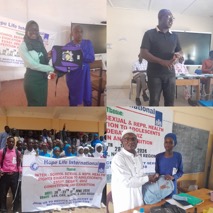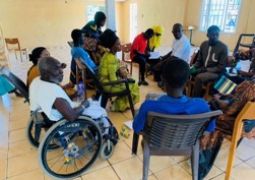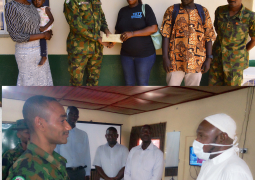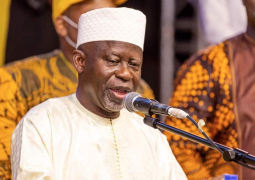
The quiz, essay, debate and exhibition funded by the Netherlands Embassy in Dakar brought together 20 schools from each region. Winners were awarded at the end of the competition. The project started in 2022. It has also trained teachers, peer to peer or ambassadors, community leaders, policy makers and crowned with inter-school competition debate, quiz and essay writing, all geared to test the knowledge of the students in targeted schools.
The quiz aimed to unearth the knowledge and skills of the students through extensive participation in the competition. The pulse and knowledge of the students from each school was tested to help strengthen the collaboration of the various institutions in the district such as MOH, GFPA, NGOs, among others.
It was also aimed to help chart a new course in ASRHR service delivery and enhance the capacity and specialty of the schools to do well in maintaining a strict protection of students right to information.
Joseph Idigba Awuru, executive director of Hope Life International (HLI) explained that the project object is to address the critical information needs of the in-school adolescent population of the beneficiary schools on reproductive, sexuality and HIV/AIDS in conformity with the relevant Gambia national SRH policy, international agreements and conventions as well as to initiate a broad-based consultation on adolescent reproductive and sexual health concerns to enable the adolescents to attain the highest standards on their own health and for the future.
Mr Awuru added that the project also aims to provide comprehensive education and information to the in-school adolescents about reproductive health and sexuality to enable them to make healthier choices, resist negative pressures and avoid risk behavior.
He added that it further aims to create a safe and supportive environment for the in-school adolescents so that they may enjoy their rights to information, education and services that will allow them to reach their full potentials.
He also said that the broad strategy of the project is to guide and empower the in-school adolescent population to enable them to enjoy their rights to information and education on reproduction, sexuality and HIV and AIDS prevention as well as to promote consultation on critical aspects of adolescent reproductive health and rights.
Regional education authorities in various regions who graced the occasion expressed delight with the initiative and commended organisers. They also said that they hope the project will be diversified across the country.
Meanwhile, according to ICPD Programme of Action, paragraph 7.2)1. “Reproductive health is a state of complete physical, mental and social well-being and not merely the absence of disease or infirmity, in all matters related to the reproductive system and to its functions and processes. Reproductive health therefore implies that people are able to have a satisfying and safe sex life and they have the capability to reproduce and the freedom to decide if, when and how often to do so. Implicit in this last condition are the right of men and women to be informed and have access to safe, effective, affordable and acceptable methods of family planning of their choice, as well as other methods of their choice for regulation of fertility which are not against the law, and the right of access to appropriate health care services that will enable women to go safely through pregnancy and childbirth and provide couples with the best chance of having a healthy infant…..”





